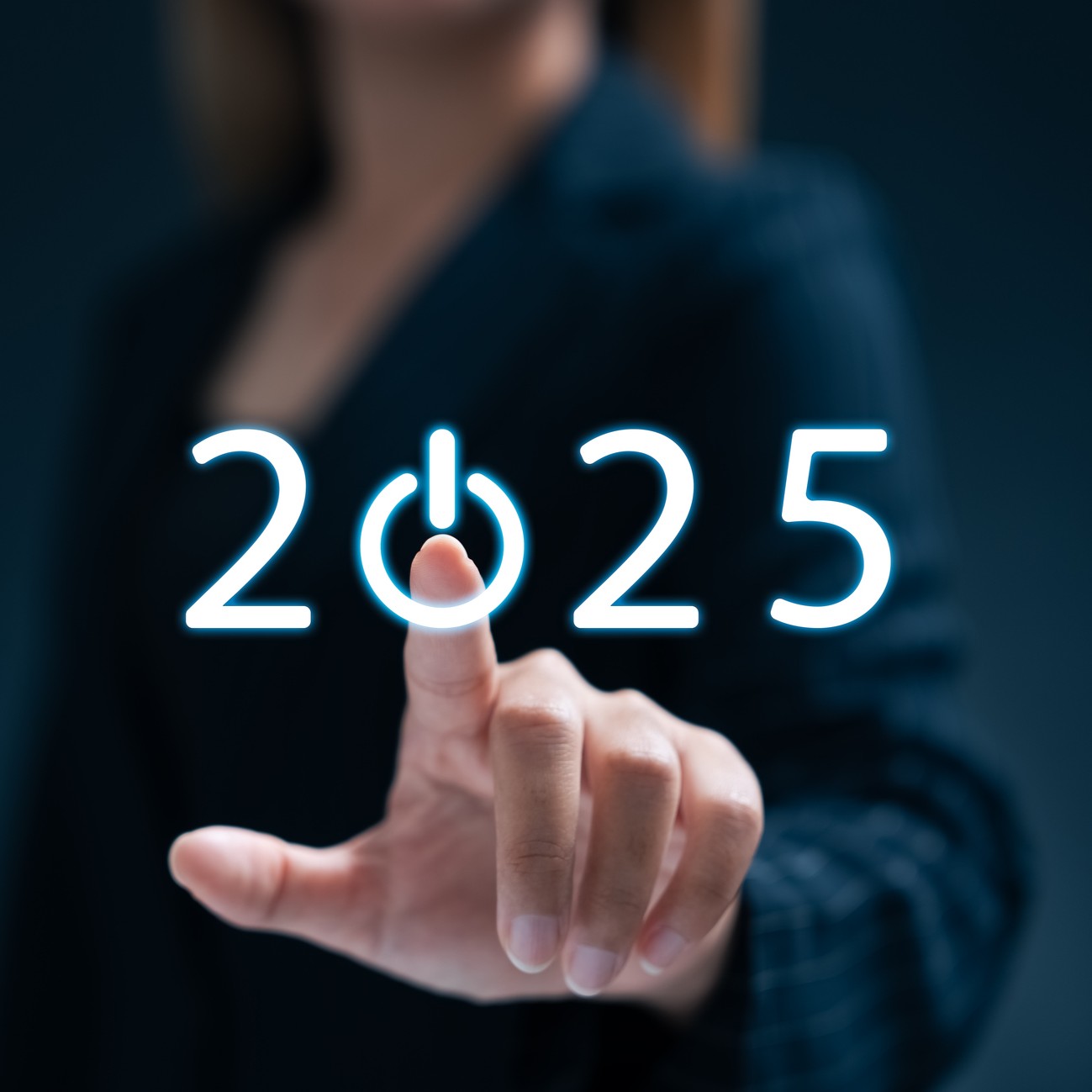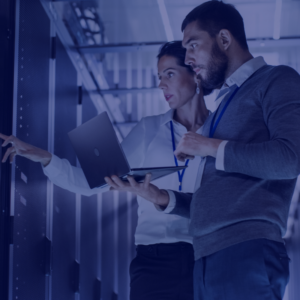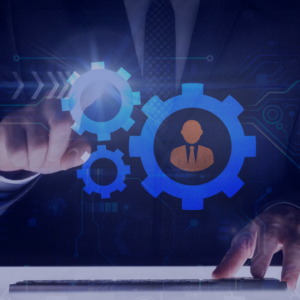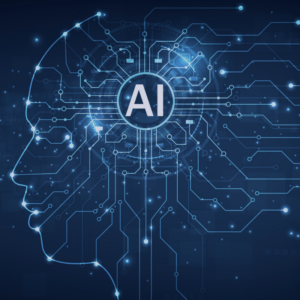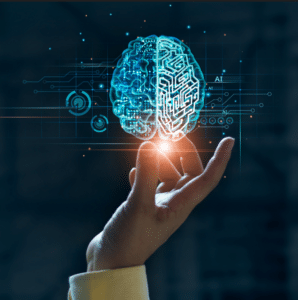What’s in store for technological advancement in the business world in the coming year? It should come as no surprise that AI will play a major role in many areas
Here are the trends that our experts foresee that will shape the IT landscape in 2025!
1. The rise of Microsoft Copilot and other autonomous agents
Did you know that nearly 70% of Fortune 500 companies already use Microsoft 365 Copilot?* According to the latest data shared by Microsoft, 2025 will witness the advent of a new generation of AI-powered agents, and you can expect much more from that technology. In particular, these autonomous agents will be able to handle more complex projects thanks to the integration of new skills and new ways of interacting.
Last November, at Microsoft Ignite, the message was clear: 2025 will be the year of AI and the importance of data. The star of this major event, Copilot, was the central topic of discussion. A great focus was placed on specialized agents that automate repetitive tasks and improve operational efficiency. These personal assistants and autonomous agents will continue to boost productivity by automating repetitive tasks and managing business processes independently, they will enable companies to concentrate on activities with higher added value.
“Just as we use different applications for different tasks, agents will transform business processes, revolutionizing how we work and manage our organizations,” said Charles Lamanna, Corporate Vice President at Microsoft.
“The integration of Copilot and other autonomous agents into the daily workflow is a revolution that is already well underway and will become even more important in the coming year.” says Charles Jenkins, Director, Microsoft 365, Dynamics 365 and Power Platform Centres of Excellence at Cofomo.
2. Advances in AI development with Microsoft Azure
On the developer side, 2025 will benefit from the unified Microsoft Azure AI Foundry solution, which aims to strengthen AI agent development tools. The platform fosters innovation while laying the foundations for safer, more responsible AI. Azure AI Foundry will bring together several existing tools to help developers create personalized, functional, and secure AI applications, resulting in a common platform that will enable collaboration between developers and the company’s stakeholders. Microsoft defines its solution as “a complete platform for building, evaluating and deploying large-scale AI applications”.
2025 will also be a great year for Azure AI Agent Service, which creates cutting-edge AI applications. Also aimed at developers, it offers a code-based approach rather than a GUI-based design, making it more suitable for power users. Azure AI Agent Service allows companies to create, implement and monitor autonomous AI agents capable of automating complex business processes by securely integrating into systems and knowledge bases.
“Microsoft understands that data is the fuel of AI and has implemented various innovations on both fronts.” says Tidjani Belmansour, Director, Microsoft Azure Centre of Excellence at Cofomo and MVP (Microsoft Most Valuable Professional).
3. AWS: the long-awaited implementation of Amazon Nova
The automation of complex workflows is a hot topic in the IT world. At the 2024 re:Invent summit, Amazon Web Services introduced Amazon Nova, a new generation of fundamental models (FMs) with advanced intelligence capable of performing a wide range of tasks at a competitive cost. The Amazon Nova models open the door even wider to multimodal agents executing autonomous multi-step workflows, including text, image and video generation.
In particular, these agents can navigate complex user interfaces and interact with APIs, simplifying processes such as customer support or managing complex systems. For example, an Amazon Nova multi-agent process will automate system troubleshooting by navigating CloudWatch dashboards, collecting logs and identifying the main causes of the problem.
The Amazon Bedrock service already offers the highly anticipated Amazon Nova models.
“Automation based on generative AI could be the key to turning operational challenges into strategic opportunities.” says André Girard, Director, AWS Centre of Excellence at Cofomo.
4. ServiceNow: A roadmap for decision-makers
ServiceNow, a cloud-based business process management and automation platform, continues integrating AI into the automation of critical processes such as IT incident management and problem resolution. Cybersecurity will remain a priority, and ServiceNow will strengthen its capabilities with real-time risk prevention tools to help anticipate cyberattacks.
The line between customer and employee experience is blurring, and by centralizing workflows and offering intuitive AI-based interfaces, ServiceNow will improve the productivity and overall satisfaction of every stakeholder, thus increasing the agility and competitiveness of organizations.
“In 2025, ServiceNow will play a role in driving innovation as part of the sustainable transformation of organizations and will significantly increase business agility and competitiveness, while ensuring an optimal experience for both in-house teams and customers.” says Mehdi Kdioui, Associate Vice President, Solutions and Projects, and ServiceNow Expert at Cofomo.
5. Enhancing cybersecurity with generative AI
Over the coming year, generative AI systems will be able to detect and block attempts by users trying to bypass security mechanisms. Technologies like Microsoft’s Prompt Shields, Google’s ShieldGemma, and IBM’s Granite Guardian models, which enable the detection of harmful content generated by users and AI within applications and services, will be crucial for identifying jailbreak attacks (UPIA).
Large Language Models (LLMs) will also need to be thoroughly examined to validate the information provided to ensure that this information is based on source data, not AI hallucinations. In addition to adjusting hyperparameters to avoid disruptions during the final adjustments (such as hallucinations in RAG (Retrieval Augmented Generation) architecture and limiting model retraining to input data only), adding an extra level of security to the configuration is now possible.
The Groundedness Detection API can also be used to check whether the textual responses of Large Language Models are based on source documents supplied by users. Groundedness refers to instances where LLMs produce information that is not factual or inaccurate in relation to the source documents; this element is featured in Azure AI Content Safety, among others.
Finally, the implementation of multimodal analyzers, including Google’s Multimodal Live API, will enable the simultaneous examination of text and images, thus better protecting applications against harmful content, user-generated or AI-generated.
“At the crossroads of AI ingenuity and cybersecurity rigour, organizations are discovering a reliable and inexhaustible set of innovations.” says Ali Amine Ghazali, Director, Artificial Intelligence Centre of Excellence at Cofomo.
6. Towards better value management and sustainable agility transformation
In 2025, agility will evolve with the integration of strategic, technological and sustainable elements. Practices such as product mode, management by value and generative artificial intelligence (GenAI) are aligned to address these complex challenges. These developments reflect a constantly evolving agility, focused on value generation and strategic alignment while preserving a harmonious balance between the implementation of practices and the embodiment of Agile principles.
Companies will increasingly adopt the product mode to reinforce team stability and accelerate time-to-market. This shift to product mode is a strong trend for organizations seeking to reach a new level of maturity by 2025.
Lean Portfolio Management is also playing a key role in maintaining strategic alignment between business priorities and IT solution investments. The shift from a PMO (Project Management Office) structure to a VMO (Value Management Office) structure ensures an Agile Project Office that manages value to become the key driver of change and innovation within the organization.
“In a world where digital transformation is redefining economic and organizational models, agility is an essential strategic response.” says Mohamed Meddeb, Director, Lean-Agile Centre of Excellence at Cofomo.
7. Change management is becoming a strategic lever for organization
In 2025, change management will be essential in the context of accelerated technological transformation. Faced with constantly evolving tools and processes, users must not only adapt but also own these changes to fully take advantage of them. Integrating change management right from the project management phase helps to reinforce buy-in, limit resistance, and optimize the transition to new ways of working.
More than a simple response to today’s challenges, change management prepares organizations to be resilient, agile and capable of evolving in an ever-changing future, thus becoming a strategic lever for maximizing the opportunities offered by new technologies while limiting risks, and above all, placing users at the heart of transformations.
In conclusion
In 2025, the importance of AI and autonomous agents, such as Microsoft Copilot and Amazon Nova, along with advancements in Microsoft Azure AI and ServiceNow, will be at the heart of innovation. These technologies will transform business processes, enhance productivity, and strengthen cybersecurity. Change management and agility will be essential for companies looking to continue progressing in this constantly evolving environment.
*Source: “Ignite 2024: Why nearly 70% of the Fortune 500 now use Microsoft 365 Copilot” – Microsoft
Questions? Contact us
If you liked this article, don’t hesitate to share it!

